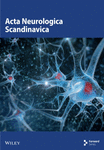A follow-up study of neuropsychological functioning in AIDS-patients Prognostic significance and effect of zidovudine therapy
Abstract
Thirty-three patients with AIDS were subjected to neuropsychological and immunological testing with semi-annual examinations over a two year period. No patient had signs of opportunistic infections or neoplasms in the CNS. Patients who were neuropsychologic ally impaired at the time of AIDS diagnosis (n = 12) survived for a significantly shorter period than did the non-impaired subjects (n = 21), and neuropsychological function at first test had a significant predictive value concerning survival time. The poor prognosis associated with impaired neuropsychological status was seen also in patients treated with zidovudine (ZDV). Of the 21 patients who started ZDV treatment shortly after the first neuropsychological examination, 12 were retested. Follow-up data showed that this group of patients had a significant improvement in neuropsychological functioning during the first 6 months. However, a decrease in performance was observed at second follow-up. In the group not treated with ZDV (n = 7), two initially normal patients developed signs of HIV-encephalopathy, while none of the initially normal ZDV-treated patients did so. This might suggest a prophylactic effect of ZDV on development of neuropsychological dysfunction. Changes in neuropsychological test results were correlated with changes in serum concentration of neopterin irrespective of ZDV treatment, suggesting that monocyte/macrophage activation may be involved in the pathogenesis of HIV-encephalopathy.




